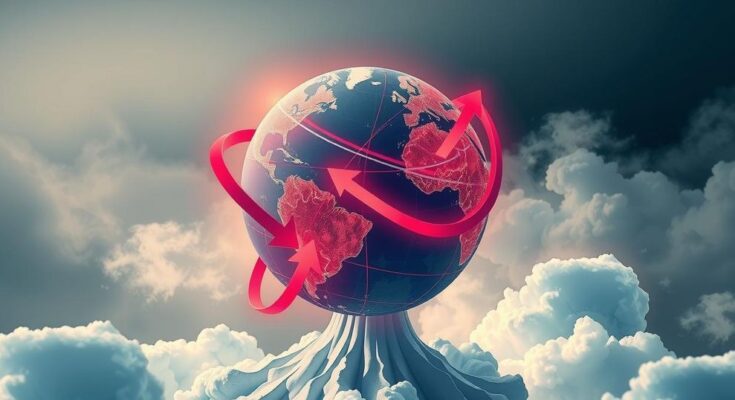The article discusses the implications of President Trump’s foreign policy changes on global dynamics, highlighting how China sees an opportunity to assert its influence amid U.S. withdrawals from international leadership. As nations react to shifting alliances and aid freezes, Beijing aims to reshape global norms while facing economic challenges. The analysis underscores the potential for both U.S. disenchantment and continued cooperation among allies against China’s rise.
The foreign policy shifts under President Donald Trump have alarmed allies and vulnerable nations alike, leading to a retreat from a leadership role in the liberal world order. As the U.S. withdraws from international agreements and strengthens ties with Russia, China positions itself as a viable alternative. At a recent G20 meeting, Chinese diplomat Wang Yi advocated for a new path to global security, free from Western influence, suggesting an opportunity for China amidst the uncertainty provoked by U.S. policies.
China’s strategy, characterized by an appeal for a reshaped world order, is becoming increasingly relevant as Trump’s administration continues its course of isolation. With the absence of U.S. Secretary of State Marco Rubio at crucial diplomatic gatherings, the opportunity for China to expand its global influence and reshape international norms has significantly grown. The conditions appear ripe for Beijing to enhance its role on the global stage, potentially garnering more allies.
However, there is skepticism about China’s ability to fill the vacuum left by the U.S. Foreign assistance, once a hallmark of U.S. engagement, has been frozen by the Trump administration. Although experts question whether China can effectively augment its global footing amid a slow economy and international scrutiny of its actions, there are signs of its intent to assert itself.
While China has historically engaged in substantial investments abroad, most of its financial commitments are structured as loans rather than direct aid. China’s recent actions, such as funding demining initiatives in Cambodia, indicate a targeted approach to regain influence in regions critical to its geopolitical interests. Despite this, analysts caution against overstating China’s readiness or capacity to absorb the lost U.S. aid without significant adjustments.
Beijing may exploit the growing disenchantment with U.S. foreign policy to enhance its economic and strategic ties with countries uncertain of American commitments. A prominent Nepalese politician recently articulated concerns regarding the repercussions of U.S. disengagement, emphasizing the potential for authoritarian powers to exploit the ensuing vacuum. Nonetheless, China’s Ministry of Foreign Affairs maintains that it continues to provide meaningful support to nations in need.
In analyzing the implications of Trump’s foreign aid policies, national security experts in the U.S. perceive a potential opportunity for countries like China and Russia to increase their global sway. Yet, it remains uncertain how Trump’s approach will evolve and impact his stance towards these nations. Some analysts suggest that current U.S. alliances in Asia remain strong, thereby limiting the extent of Beijing’s advancements.
Although uncertainties regarding U.S. foreign policy could enhance China’s strategic positioning, there are also signs that these developments may spur increased cooperation among U.S. allies in Asia. Continued U.S.-Philippines defense collaborations and joint military exercises indicate a commitment to counter Beijing’s perceived aggressions. Overall, the future of U.S.-China relations hangs in the balance as both countries navigate the challenges posed by shifting global dynamics.
President Trump’s changes to U.S. foreign policy have created a vacuum that China seeks to exploit to enhance its global influence. While China aims to redefine international norms and strengthen its alliances, its capacity to fully replace U.S. leadership remains questionable. The evolving diplomatic landscape presents both opportunities and challenges for Beijing while highlighting the resilience of American partnerships in the Asia-Pacific region. Ultimately, the future dynamics between the U.S. and China will depend on strategic responses and evolving geopolitical circumstances.
Original Source: www.cnn.com




